
-
 Trump brings back government by social media
Trump brings back government by social media
-
Animal rights activist on FBI 'most wanted terrorist' list arrested

-
 Netanyahu seeks ceasefire after two months of war in Lebanon
Netanyahu seeks ceasefire after two months of war in Lebanon
-
Trump tariffs threat casts chill over Canada

-
 Hong Kong tycoon Jimmy Lai's court case a 'show trial': son
Hong Kong tycoon Jimmy Lai's court case a 'show trial': son
-
Blinken says Lebanon ceasefire talks 'in final stages'

-
 Mascherano re-unites with Messi as new coach of Inter Miami
Mascherano re-unites with Messi as new coach of Inter Miami
-
Real Madrid's Bellingham gone from 'scapegoat' to smiling

-
 Bangladeshi Hindus protest over leader's arrest, one dead
Bangladeshi Hindus protest over leader's arrest, one dead
-
Celtic fuelled by Dortmund embarrassment: Rodgers

-
 Salah driven not distracted by contract deadlock, says Slot
Salah driven not distracted by contract deadlock, says Slot
-
Algeria holds writer Boualem Sansal on national security charges: lawyer

-
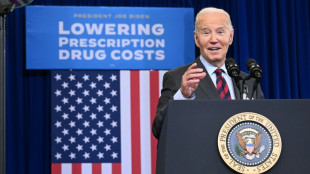 Biden proposes huge expansion of weight loss drug access
Biden proposes huge expansion of weight loss drug access
-
Saudi 2025 budget sees lower deficit on spending trims

-
 Pogba's brother, five others, on trial for blackmailing him
Pogba's brother, five others, on trial for blackmailing him
-
Prosecutors seek up to 15-year terms for French rape trial defendants

-
 Emery bids to reverse Villa slump against Juventus
Emery bids to reverse Villa slump against Juventus
-
Carrefour attempts damage control against Brazil 'boycott'

-
 Namibians heads to the polls wanting change
Namibians heads to the polls wanting change
-
Sales of new US homes lowest in around two years: govt

-
 Paris mayor Hidalgo says to bow out in 2026
Paris mayor Hidalgo says to bow out in 2026
-
Stocks, dollar mixed on Trump tariff warning

-
 ICC to decide fate of Pakistan's Champions Trophy on Friday
ICC to decide fate of Pakistan's Champions Trophy on Friday
-
Man Utd revenue falls as Champions League absence bites

-
 Russia vows reply after Ukraine strikes again with US missiles
Russia vows reply after Ukraine strikes again with US missiles
-
Trump threatens trade war on Mexico, Canada, China

-
 Motta's injury-hit Juve struggling to fire ahead of Villa trip
Motta's injury-hit Juve struggling to fire ahead of Villa trip
-
Cycling chiefs seek WADA ruling on carbon monoxide use

-
 Israel pounds Beirut as security cabinet to discuss ceasefire
Israel pounds Beirut as security cabinet to discuss ceasefire
-
Fewest new HIV cases since late 1980s: UNAIDS report
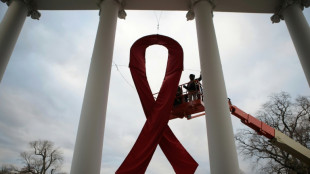
-
 4 security forces killed as ex-PM Khan supporters flood Pakistan capital
4 security forces killed as ex-PM Khan supporters flood Pakistan capital
-
Four bodies, four survivors recovered from Egypt Red Sea sinking: governor

-
 Ayub century helps Pakistan crush Zimbabwe, level series
Ayub century helps Pakistan crush Zimbabwe, level series
-
French court cracks down on Corsican language use in local assembly

-
 Russia expels UK diplomat accused of espionage
Russia expels UK diplomat accused of espionage
-
Israeli security cabinet to discuss ceasefire as US says deal 'close'

-
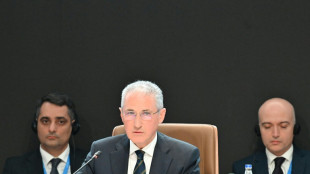 COP29 president blames rich countries for 'imperfect' deal
COP29 president blames rich countries for 'imperfect' deal
-
No regrets: Merkel looks back at refugee crisis, Russia ties

-
 IPL history-maker, 13, who 'came on Earth to play cricket'
IPL history-maker, 13, who 'came on Earth to play cricket'
-
Prosecutors seek up to 12-year terms for French rape trial defendants

-
 Laos hostel staff detained after backpackers' deaths
Laos hostel staff detained after backpackers' deaths
-
Hong Kong LGBTQ advocate wins posthumous legal victory

-
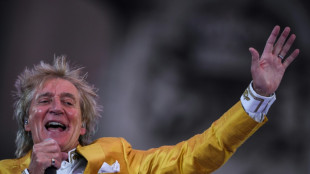 Rod Stewart to play Glastonbury legends slot
Rod Stewart to play Glastonbury legends slot
-
Winter rains pile misery on war-torn Gaza's displaced
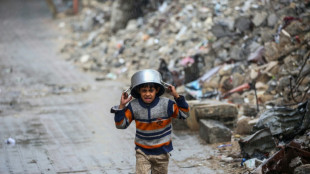
-
 'Taiwan also has baseball': jubilant fans celebrate historic win
'Taiwan also has baseball': jubilant fans celebrate historic win
-
Russia pummels Ukraine with 'record' drone barrage

-
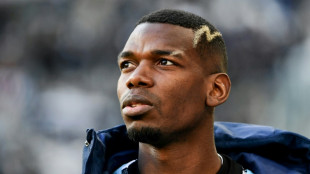 Paul Pogba blackmail trial set to open in Paris
Paul Pogba blackmail trial set to open in Paris
-
Landmine victims gather to protest US decision to supply Ukraine

-
 Indian rival royal factions clash outside palace
Indian rival royal factions clash outside palace
-
Manga adaptation 'Drops of God' nets International Emmy Award

| RBGPF | 1.33% | 61 | $ | |
| RYCEF | 0.44% | 6.8 | $ | |
| NGG | -0.86% | 62.72 | $ | |
| BCC | -3.1% | 147.92 | $ | |
| CMSC | -0.69% | 24.56 | $ | |
| RIO | -1.84% | 61.84 | $ | |
| SCS | -2.16% | 13.43 | $ | |
| GSK | -0.63% | 33.935 | $ | |
| RELX | 0.3% | 46.71 | $ | |
| BTI | 0.69% | 37.59 | $ | |
| BCE | -1.56% | 26.605 | $ | |
| JRI | -0.35% | 13.323 | $ | |
| VOD | -0.56% | 8.86 | $ | |
| BP | -1.55% | 28.872 | $ | |
| AZN | -0.29% | 66.21 | $ | |
| CMSD | -0.71% | 24.407 | $ |

UN nuclear chief heads to Iran for crucial talks
International Atomic Energy Agency chief Rafael Grossi is set to visit Tehran on Wednesday for crucial talks on Iran's nuclear programme, warning just ahead of his trip that room for manoeuvre is narrowing.
His visit comes only two days after the defence minister of Iran's nemesis Israel warned the Islamic republic was "more exposed than ever to strikes on its nuclear facilities".
Israel has long accused Iran of seeking to acquire nuclear weapons, a claim Tehran denies.
The two countries have traded missile strikes this year, as tensions soar over Israel's war on Iran's allies, Hamas in Gaza and Hezbollah in Lebanon.
The strikes have brought to the surface their years-long shadow war and fuelled fears of a wider Middle East conflict.
"The margins for manoeuvre are beginning to shrink," Grossi said in an interview with AFP ahead of his visit, adding that "it is imperative to find ways to reach diplomatic solutions".
While the IAEA is allowed to carry out inspections in Iran, Grossi stressed the need for "more visibility" into Iran's nuclear programme, given its scale and ambition.
Grossi's trip comes after Donald Trump -- who pulled out of a hard-won nuclear deal with Iran negotiated under Barack Obama -- was voted back into the White House.
Trump said last week that he was not seeking to harm Iran and instead wanted its people to have "a very successful country", while insisting "they can't have a nuclear weapon".
In 2015, major world powers including the United States reached an agreement with Iran on its nuclear programme after 21 months of talks.
The text provided for an easing of international sanctions on Iran in exchange for guarantees that it would not seek nuclear weapons.
But Trump withdrew from the agreement in 2018 before re-imposing US sanctions on Iran.
A year later, Iran started to gradually roll back its commitments to the nuclear deal, which only allowed Tehran to enrich uranium to 3.65 percent purity.
The IAEA says Iran has considerably increased its reserves of enriched uranium to 60 percent, close to the 90 percent needed to develop an atomic bomb.
It is against this backdrop that Grossi is schedule to visit Iran for the first time since May.
In a statement, the IAEA said it would hold "high-level meetings with the Iranian government" and conduct "technical discussions on all aspects".
- Cameras unplugged -
Iranian President Masoud Pezeshkian, who came to office in July with hopes of improving ties with the West and having sanctions lifted, favours a revival of the nuclear deal.
But all efforts to get the nuclear agreement off life support have so far failed.
The IAEA chief has repeatedly called for more cooperation from Iran.
In recent years, Tehran has decreased its interaction with the UN agency by deactivating surveillance devices needed to monitor the nuclear programme and effectively barring its inspectors.
The foundations of Iran's nuclear programme date back to the late 1950s, when the United States signed a civil cooperation agreement with then-Iranian Shah Mohammad Reza Pahlavi.
In 1970, Iran ratified the Non-Proliferation Treaty (NPT), which requires signatory states to declare and place their nuclear materials under the IAEA control.
But with Iran threatening to hit back at Israel for its latest missile strikes, some lawmakers in the Islamic republic have called on the government to revise its nuclear doctrine to pursue nuclear weapons.
The parliamentarians called on supreme leader Ayatollah Ali Khamenei, who wields ultimate authority in Iran, to reconsider his long-standing religious edict or fatwa banning nuclear weapons.
The Islamic republic has maintained its policy against acquiring nuclear weapons, insisting its nuclear activities were entirely peaceful.
A.Silveira--PC
